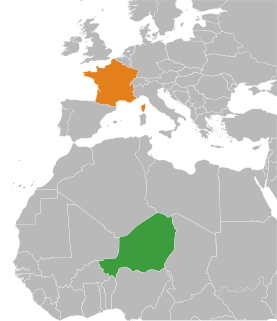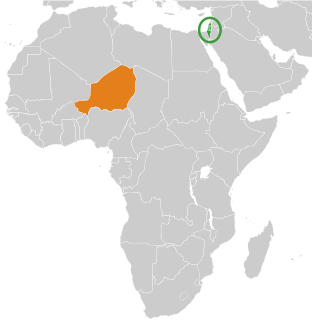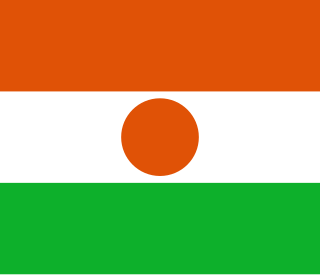Ide Oumarou (1937–2002) was a Nigerien diplomat, government minister, and journalist. He served as ambassador to the United Nations between 1980 and 1983. He then served as the foreign minister between 1983 and 1985 and was secretary-general of the Organisation of African Unity between 1985 and 1988. He was educated at the Ecole William Ponty in Dakar and IHEOM in Paris. He was an editor and journalist at the Niger Ministry of Information, serving as editor of state paper Le Niger from 1961 to 1963. He became director general of Information from 1963 to 1972, and then became director of Posts and Telecommunication for the Ministry. Following the 1974 Nigerien Coup d'état, he became cabinet chief and assistant to Military Head of State Seyni Kountche, becoming a particularly close adviser.

Elections in Niger take place within the framework of a semi-presidential system. The President and National Assembly are elected by the public, with elections organised by the Independent National Electoral Commission (CENI).

Seyni Kountché was a Nigerien military officer who led a 1974 coup d'état that deposed the government of Niger's first president, Hamani Diori. He ruled the country as military head of state from 1974 to 1987. Stade Général Seyni Kountché, Niger's national stadium in Niamey, is named after him.

Hamani Diori was the first President of the Republic of Niger. He was appointed to that office in 1960, when Niger gained independence. Although corruption was a common feature of his administration, he gained international respect for his role as a spokesman for African affairs and as a popular arbitrator in conflicts. His rule ended with a coup in 1974.

The Nigerien Progressive Party – African Democratic Rally is a political party in Niger. It was the leading political party of the pre-independence era, becoming the sole legal party of the First Republic (1960–1974). It was led by Niger's first President, Hamani Diori. After the end of military rule, the party reappeared as a minor parliamentary party led by Diori's son, Abdoulaye Hamani Diori.

The unicameral National Assembly is Niger's sole legislative body. The National Assembly may propose laws and is required to approve all legislation.
Hamid Algabid is a Nigerien politician and the President of the Rally for Democracy and Progress (RDP-Jama'a) party. A lawyer, banker, and technocrat, Algabid was an important figure in the regime of Seyni Kountché, serving as Prime Minister of Niger from 1983 to 1988. He was Secretary-General of the Organisation of the Islamic Conference (OIC) from 1989 to 1996, and since 1997 he has been President of the RDP-Jama'a. He was also President of the High Council of Territorial Collectivities (HCCT) until 2010.
Adamou Assane Mayaki was a Nigerien politician and diplomat. Mayaki was the Foreign Minister of Niger from 1963–1965, and a leading member of the ruling PPN-RDA party.

The Republic of Niger has had seven constitutions, two substantial constitutional revisions, and two periods of rule by decree since its independence from French colonial rule in 1960. The current "Seventh Republic" operates under the Constitution of 2010.

The Union of Popular Forces for Democracy and Progress-Sawaba is a political party in Niger, founded as the Nigerien Democratic Union in 1954. The original party, founded by Nigerien Progressive Party (PPN) co-leader Djibo Bakary when he was expelled from the PPN. In the mid-1950s it created a broad coalition led by urban leftists but forged of conservative rural notables, especially from Hausa areas, which dominated the nascent Nigerien independence movement. In this period it was renamed Mouvement Socialiste Africain-Sawaba, and then simply Sawaba. In pushing for complete independence from France in a 1958 referendum, the party fractured. At independence in 1960 it found itself in opposition and outlawed by Niger's first president, Hamani Diori. From exile, the party attempted an abortive guerrilla campaign in the mid-1960s, and then largely disappeared. Its leadership returned to Niger following the 1974 military coup, but soon found themselves arrested, in exile, or marginalised. Following the return of democracy in 1991, the now elderly Bakary re-founded the party as UDFP-Sawaba. In the 1993 elections it took only a small numbers of votes. Within the year the party had split, with a new faction (UDFR-Sawaba) joining the government coalition. Despite Bakary's death in 1998 and their continued electoral underachievement, both parties holding the Sawaba name continue.
Boubou Hama was a Nigerien author, historian, and politician. He was President of the National Assembly of Niger under President of Niger, Hamani Diori.

France–Niger relations refer to foreign relations between France and the Niger. Their relations are based on a long shared history and the more than sixty year rule of Niger by French colonial empire beginning with the French conquest in 1898. Niger obtained independence from France in 1960, and a history of French influenced culture and French language have been a point of commonality in the creation of a distinctive Nigerien culture from the diverse pre-colonial nationalities which make up modern Niger. France benefited economically from their time as a colonial power, and still relies on imports from Niger for elements of their economy.

There are no formal Bilateral relations between the government of Israel and the Republic of Niger. Diplomatic relations between the countries were active between the independence of Niger in 1960 and 1973. Relations were renormalised in 1996, but terminated by Niger in 2002. There are no special travel or trade restrictions between citizens of the nations.
Mamadou Maidah (1924–2005) was a Nigerien politician and diplomat. Mamadou was the Foreign Minister of Niger from 1963 to 1965, and a leading member of the ruling PPN-RDA party.
Zodi Ikhia was a Nigerian politician.
A coup d'état occurred in Niger on 18 February 2010. Soldiers attacked the presidential palace in Niamey under weapons fire at midday and captured President Mamadou Tandja, who was chairing a government meeting at the time. Later in the day, the rebels announced on television the formation of the Supreme Council for the Restoration of Democracy (CSRD), headed by chef d'escadron Salou Djibo.

Lieutenant General Salou Djibo is a Nigerien military officer. After President Mamadou Tandja's attempts to remain in power after the end of his term, Djibo led the military coup of 18 February 2010 that ousted Tandja, after which he became the head of the Supreme Council for the Restoration of Democracy. The Supreme Council returned power to the government after the 2011 elections.

The Nigerien Action Bloc was a political party in Niger in 1955 and 1956 led by Issoufou Saïdou Djermakoye, a traditional chief and former chairman of the Nigerien Progressive Party (PPN).

Aissa Diori also known as Aïchatou Diori was the wife of Hamani Diori and the First Lady of Niger. She amassed a large wealth through corruption, including high-priced real estate. She was killed in the 1974 Nigerien coup d'état.











